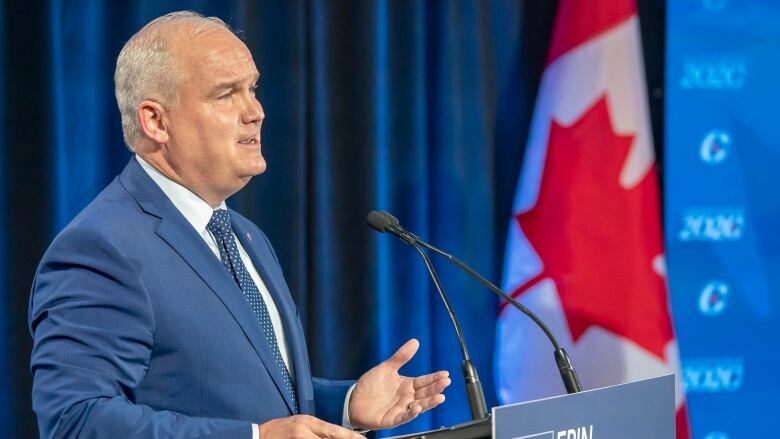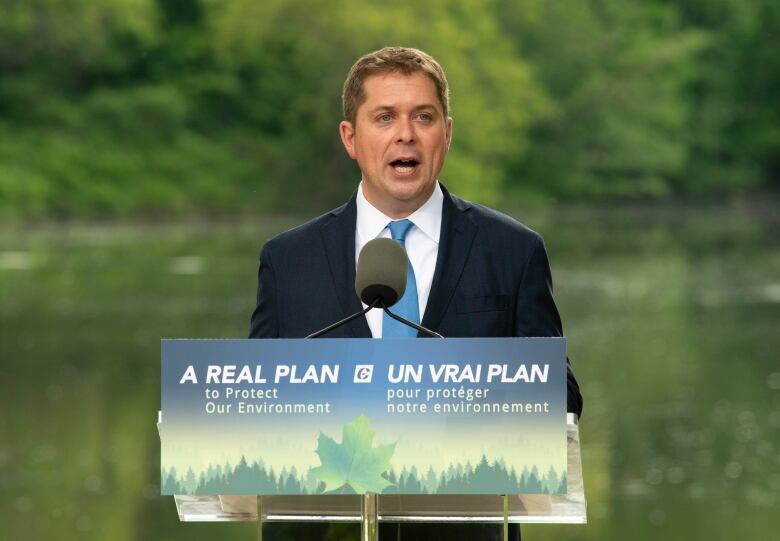It's time for Conservatives to learn their lesson on climate policy, O'Toole says
OToole says his party failed to take environmental policy seriously in 2019 election

Conservative Party leadership candidate Erin O'Toole says the Tories need to take environmental policy seriously if they want to win the next general election.
He sees it as a vital part of expanding the capacity of the "big blue tent" the party is often touted as.
The leadership contestants are engaged in a balancing act that many before them have struggled to perfect: how to appeal to the Conservative base while simultaneously attracting other voters.
O'Toole says his party's stance on the environment during the 2019 election failed to do that.
"Voters in my region and the suburbs of Torontowant to know that we have a serious plan on the environment," he told CBC's West of Centre podcast.
"We've said we're against the carbon tax 10,000 times, we've never said what we're going to do."

But his own stance has faced criticism.
His initial platform promised an environment plan that would end "fossil fuel subsidies, a form of corporate welfare."
Those subsidies are a touchy topic, especially in oil-rich provinces like Alberta and Newfoundland and Labrador.
It was quickly rewritten as an approach that "simplifies the tax code to create confidence in the resource sector and support its actions towards emission reduction."
O'Toole acknowledged the original phrasing was clumsy.
"We kind of stepped on a bit of a landmine by allowing that word to represent what we were saying, so we quickly clarified it."
Canada needs to remain competitive with the United Stateson energy, he said, repeating one of his main messages. It's why he doesn't like the current federal carbon tax "mainly because it's uncompetitive."
When asked how he would adjust his climate strategy if the administration south of the border shifts, he attacked the Trudeau government.
"We don't pick a dumb plan," he said. "Trudeau's plan is a dumb plan."
O'Toole added that his party's environment plank from its last election platform wasn't much better.
He didn't elaborate more broadly on what his own strategy would look like if he wins the leadership. His current platform includes priorities, but not policy.
O'Toole's emphasis on a climate plan may appeal to a broad swath of voters, but he has to prove his mettle to his own party first. Much of that emphasis has been placed on Alberta.
Campaign launch in Calgary
Duane Bratt, a political scientist at Mount Royal University, says that's a smart move.
"He's clearly describing himself as an Ontarian that has support in Alberta, and that's what his path to victory is."
O'Toole launched his campaign in Calgary. He scored the endorsement of a Conservative heavy-hitter, Premier Jason Kenney, followed by a smattering of provincial cabinet ministers.
He's proud of securing that vote of confidence, saying Kenney's endorsement holds more weight than his others.
Laughing, he also admitted he's a little relieved the premier didn't decide to take a run at the leadership.
"He'd be hard to beat. I'd be the first person to admit that."
The new Conservative leader will have to manoeuvresensitive issues in the province like equalization, separation and the future of the energy sector.
If there's not a delicate hand at the helm, O'Toole said, he fears Wexit Canada a party advocating for Alberta and the other Western provinces to secede could hack away votes from the Conservatives in a federal election.
"Splitting the right only helps the Liberals," he said. "We've got to learn that lesson."
- Most Canadians opposed to Wexit, but poll finds new party could pose challenge to Conservatives
- Jay Hill, former House leader under Harper, named interim head of separatist party Wexit Canada
It's a concern for the leadership hopeful, so his pitch to those feeling abused by Ottawa is to elect a Conservative government and then see how they feel.
He's spoken with new interim Wexit leader Jay Hill and says they have a good relationship.
Jared Wesley, a professor at the University of Alberta, says addressing separatist factions is a dangerous game that the next Conservative leader will have to play carefully.
"It's a means to try to get people's attention more than anything else," he said, cautioning that referendums can have significant unintended consequences.
There's often regional turmoil between Ontario and the West, and disenfranchised voters argue that too much attention is paid to the seat-rich regions in Eastern Canada.
Being from Ontario could hurt O'Toole's chances with some western voters, but he pays that little mind.
"I think it matters less exactly where you're from, as opposed to how you're going to unite the country."
How soon should the new Conservative leader be ready for the next general election?
O'Toole didn't hesitate.
"Immediately."
- Listen to the complete West of Centre podcast seriesright here.
With files from Kathleen Petty and West of Centre












_(720p).jpg)


 OFFICIAL HD MUSIC VIDEO.jpg)
.jpg)



























































































